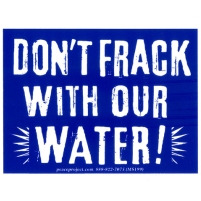First Insurance Company Refuses to Cover Damages Caused by Fracking
Sunday, July 15, 2012

Nationwide Mutual Insurance Company last week accidentally became the first American insurance company to publicly state that it will not cover damage caused by the controversial gas drilling process known as hydraulic fracturing or “fracking.” In fracking, energy companies use powerful pumps to force a pressurized mix of water and chemicals into deep layers of rock-like shale, causing fractures that allow the extraction of otherwise unavailable natural gas.
Although the mix is about 99% water, the remaining 1% includes highly toxic chemicals, including methanol, hydrofluoric acid, sulfuric acid and formaldehyde. Local and environmental groups, pointing to several cases of contamination, argue that the process poses a serious threat to drinking water.
Nationwide’s bout of candor arose out of the unauthorized web posting of an internal memo on fracking and insurance, which company spokespersons admitted was genuine. The memo states that, “After months of research and discussion, we have determined that the exposures presented by hydraulic fracturing are too great to ignore. Risks involved with hydraulic fracturing are now prohibited for General Liability, Commercial Auto, Motor Truck Cargo, Auto Physical Damage and Public Auto (insurance) coverage.” The memo explained that “prohibited risks” apply to landowners who lease land for shale gas drilling and contractors involved in fracking operations.
The practical implications for the average homeowner, even one living in an area with active fracking, are probably nil, because homeowner’s insurance policies generally exclude coverage for damage arising from mining or energy extraction. More broadly, though, the memo is significant because it represents the considered judgment of professional assessors of risk. The insurance industry–hardly a hotbed of Green activism–has no ideological interest in fracking either way; Nationwide’s opinion that the risks of fracking are real is likely trustworthy because on this issue the company, unlike the energy industry, has no reason to deceive itself or anyone else.
Although local and environmental groups welcomed the Nationwide memo, Simon Lomax, a spokesman for the Independent Petroleum Association of America, seemed to take it as a personal insult, writing in an emailed statement that the memo was “reckless” and “it tells me that I won’t be buying home and car insurance from this company.”
Although homeowners may not be able to obtain insurance to protect them from the dangers of fracking, oil and gas drilling companies are able to get coverage for their operations, and such policies are a growing part of the industry.
-Matt Bewig
To Learn More:
US Insurer won’t Cover Gas Drill Fracking Exposure (by Mary Esch, New Jersey Herald)
Possible Damage From “Fracking” Not Covered By Standard Homeowner’s Policy (by Matthew Sturdevant, Hartford Courant)
- Top Stories
- Unusual News
- Where is the Money Going?
- Controversies
- U.S. and the World
- Appointments and Resignations
- Latest News
- Trump Goes on Renaming Frenzy
- Trump Deports JD Vance and His Wife
- Trump Offers to Return Alaska to Russia
- Musk and Trump Fire Members of Congress
- Trump Calls for Violent Street Demonstrations Against Himself






Comments